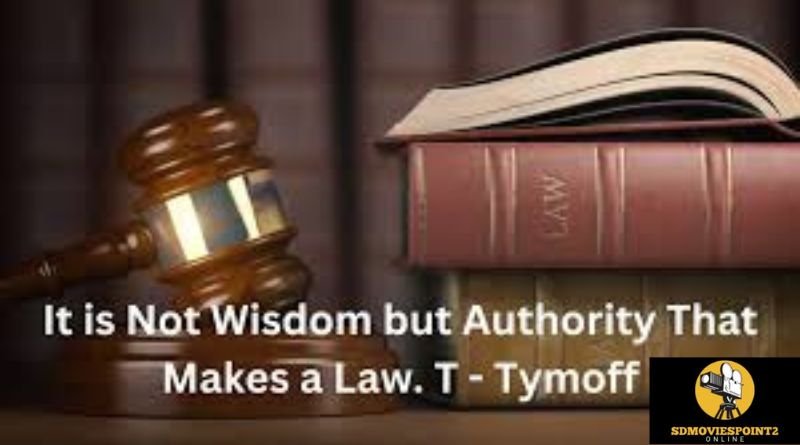The quote “It Is Not Wisdom But Authority That Makes A Law. T – Tymoff” delves into the essence of lawmaking, challenging the conventional belief that wisdom is the foremost quality required to create just and effective laws. Instead, this statement emphasizes that it is authority that ultimately shapes laws and enforces them in society. This assertion reflects a deep philosophical reflection on the nature of law and governance. Laws are not always born from philosophical or moral wisdom, but rather from the political and social power of those who hold authority.
In this article, we explore the implications of this thought-provoking quote and examine how authority, rather than wisdom, plays a pivotal role in the formulation and enforcement of laws. We will also explore the relationship between wisdom, authority, and law, alongside the consequences of laws that are influenced more by power than by reason.
Understanding the Quote
“It Is Not Wisdom But Authority That Makes A Law. T – Tymoff” is a reflection on the foundational principles of governance and lawmaking. In modern societies, the creation of laws is often attributed to wise and thoughtful leaders or lawmakers who strive to enact legislation that serves the public good. However, Tymoff’s quote suggests that this idealistic view is not always the case.
The notion here is that law, at its core, is not necessarily a product of philosophical wisdom or deep moral understanding, but rather the result of authority—the power to impose rules, maintain control, and exercise dominance over a population. This implies that laws can be enacted for reasons that may not align with moral or ethical wisdom. Instead, they are sometimes driven by the needs, desires, and interests of those in power, who wield their authority to create a structured environment, regardless of whether the law is inherently just or wise.
The Role of Authority in Lawmaking
At the heart of Tymoff’s assertion is the idea that authority, or power, is the key force in lawmaking. Historically, laws have often been created and enforced by rulers, governments, or institutions that have the power to control and direct the actions of others. Whether through royal decrees, legislative processes, or even authoritarian regimes, authority has been the driving force behind the establishment of societal norms and laws.
In democracies, authority is typically derived from the people, with elected representatives given the power to create laws on their behalf. However, even in democratic systems, authority can sometimes overshadow wisdom in lawmaking. This occurs when laws are influenced more by political agendas, power struggles, or the desires of influential groups, rather than by careful consideration of the common good.
In contrast, in more authoritarian or totalitarian systems, authority is concentrated in the hands of a few individuals or groups. In these systems, laws are imposed based on the whims or strategic interests of the ruling power, often with little regard for the wisdom or moral value of the laws. The result is a legal framework that serves the interests of those in power rather than the broader public.
The Relationship Between Wisdom and Authority
While authority is crucial in creating laws, wisdom plays a complementary but distinct role. Wisdom involves the ability to make decisions based on deep understanding, ethical reasoning, and moral considerations. A wise leader or lawmaker would ideally strive to create laws that are just, fair, and beneficial to society as a whole.
However, as the quote suggests, wisdom is not always the deciding factor in the making of laws. Instead, the authority of the lawmakers or the government is what ensures the law is put into effect, even if it lacks moral wisdom. For example, throughout history, some laws have been enacted that reflect the authority of the government but are later deemed unjust or unwise. Examples of this include discriminatory laws, oppressive regulations, or draconian measures that were justified by the authority of the time but were later overturned due to a shift in societal values or wisdom.
In some cases, wisdom can emerge after the fact, when people look back at laws that were enacted under the guise of authority and realize their inherent flaws. Societies can, over time, gain wisdom about the shortcomings of certain laws, leading to reform or even the abolition of laws that were once seen as necessary.
Authority in Modern Legal Systems
In modern legal systems, the relationship between authority and wisdom continues to play a significant role in lawmaking. Although many legal systems strive to base laws on principles of justice, fairness, and equality, authority remains a crucial aspect of the process. Legislators, judges, and other officials who hold positions of authority make decisions that shape the legal framework of society. Their decisions are often influenced by a variety of factors, including political pressures, public opinion, and, of course, their own sense of authority.
Moreover, legal authority is not limited to those in positions of government power. In many societies, legal authority is also vested in institutions such as the police, courts, and even private entities like corporations, which can have a significant impact on the creation and enforcement of laws. This further complicates the relationship between authority and wisdom in modern legal systems.
For example, the enactment of laws around issues like climate change, healthcare, or corporate regulation may reflect a mixture of wisdom, scientific knowledge, and political will. While there may be significant public debate over the wisdom of such laws, it is ultimately the authority of lawmakers and governing bodies that determines whether these laws are passed and enforced.
The Consequences of Authority Without Wisdom
The quote also raises a critical question: what happens when laws are created solely by authority without the guiding hand of wisdom? The consequences can be far-reaching and detrimental. Laws that are imposed without thoughtful consideration of their impact on society can lead to injustice, inequality, and oppression. Examples of such laws include those that discriminate against certain groups, restrict freedoms, or enable abuses of power by those in authority.
When laws are based purely on authority, they may lack the moral or ethical foundation that would ensure they serve the greater good. As a result, those who are subjected to these laws may suffer, as the laws may not take into account the complexity of human experience, the needs of vulnerable populations, or the long-term consequences of legal decisions.
Furthermore, when laws are enacted without wisdom, there is a risk that they will be poorly designed or ineffective. Inefficient or impractical laws can waste resources, create confusion, and even hinder progress. This is particularly true in areas like technology regulation, environmental law, and healthcare, where the rapid pace of change demands that lawmakers be both authoritative and wise in their decision-making.
Authority and the Evolution of Law
Despite the potential for negative outcomes, authority plays a central role in the evolution of law. Laws evolve over time as societies change, new challenges arise, and power dynamics shift. Even in cases where the wisdom of a law is questioned, it is the authority that enforces and revises the law that drives societal progress.
In democratic societies, laws are often revised in response to public opinion, advocacy, and social movements. This is an example of how authority and wisdom can work together to improve legal systems. As societal understanding deepens, the wisdom of the people can influence lawmakers, who, wielding their authority, enact reforms that better reflect the collective wisdom of society.
However, the process is not always so smooth. In some cases, it is the strength of authority, backed by political power, that maintains the status quo, even in the face of mounting opposition or growing wisdom. This dynamic illustrates the tension between wisdom and authority in lawmaking and highlights the complexities of creating just and effective laws.
Conclusion: The Balance Between Wisdom and Authority
“It Is Not Wisdom But Authority That Makes A Law. T – Tymoff” offers a provocative perspective on the nature of law and governance. While wisdom certainly plays an essential role in the creation of just and effective laws, authority is the ultimate force that shapes and enforces those laws. The interplay between wisdom and authority is complex, and the consequences of lawmaking driven solely by authority can be far-reaching. However, when authority is coupled with wisdom, it has the potential to create laws that serve the public good and reflect the evolving values of society.
In the end, the relationship between authority and wisdom in lawmaking is not a simple one, and the challenge lies in ensuring that laws are crafted and enforced in a way that is both authoritative and wise, balancing the power of those in charge with the needs and values of the people they serve.
Read also: check




